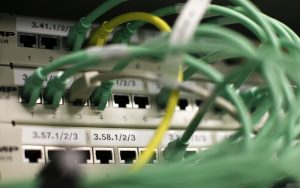THE Department of Information and Communications Technology (DICT) said it will support legislation that will require telecommunications companies to guarantee minimum internet speeds for consumers and set standards for telco integration in residential property design.
“’Yan ang madalas na reklamo ng ating publiko, na binibigyan sila ng ‘up to’ sa offering nila (This is the most common complaint of our consumers, that they are only guaranteed a maximum speed),” Information and Communications Secretary Ivan John E. Uy told reporters on the sidelines of PLDT, Inc.’s Jupiter Cable System launch on Friday.
“Kung up to 50 (megabits per second) Mbps, puwede kang bigyan ng 50 kilobits per second (Kbps),” he added. (If they promise an internet speed of up to 50 Mbps, they can give you 50 Kbps.)
Senator Mary Grace S. Poe-Llamanzares recently refiled Senate Bill No. 329, or the proposed Better Internet Act, which requires service providers to adhere to minimum standards for connection, reception, pricing, and billing practices.
“The internet has become a necessity as indispensable as electricity and water. We rely on it for health, education, business, governance and more,” Ms. Poe said.
Mr. Uy said the department also supports a house bill that seeks to provide telco space for network infrastructure in housing developments.
“Actually, I have been pushing for that, not only in subdivisions, but in the construction of high-rise buildings,” he said.
“I fully support it. In fact, in one of my talks before in the Chamber of Commerce, I pushed for the revision of National Building Code. The building code requires the provision of electricity, water and sewerage, but not telecommunications,” he noted.
He said allocating space for network infrastructure in housing and high-rise building projects will help ensure equitable and expansive internet access across the Philippines.
“You won’t have instances where when you go inside the building, you go inside the elevator and you have no signal. You go to the parking underground, you have no signal. Those buildings were never designed for telco. I think that should be included from the very onset. When you design the building, it should be integrated there,” he said.
Isabela Rep. Faustino A. Dy V has said he would refile the House bill that seeks to require developers to properly provision ICT facilities for telcos.
PLDT’S JUPITER CABLE SYSTEM
The PLDT group announced on Friday that the Jupiter Cable System, the latest addition to its 16 international cables routing critical data traffic in and out of the country, is now servicing the Philippines.
The new cable system traverses the Pacific Ocean from North America connecting directly to Maruyama and Shima in Japan and to Daet, Camarines Norte.
PLDT officials said it is now the fastest cable system between the Philippines and the US.
“It will increase PLDT’s international capacity of 20 Terabit/s to about 60 Terabit/s,” the company said in a statement.
“Jupiter is the first international submarine cable system in the Philippines to use an Open Cable Model that allows PLDT to power up and deliver hyperscale bandwidth more quickly to enterprises across the world,” it added.
This development strengthens the company’s strategy in helping position the Philippines as the next hyperscaler hub of Asia-Pacific, PLDT, Inc. and Smart Communications, Inc. President and Chief Executive Officer Alfredo S. Panlilio said during a briefing.
The new cable system is also expected to support the hyperscale ecosystem, which includes data centers, subsea cables, the domestic fiber network, 5G, cloud, and the Internet of Things, PLDT officials said.
Hastings Holdings, Inc., a unit of PLDT Beneficial Trust Fund subsidiary MediaQuest Holdings, Inc., has a majority stake in BusinessWorld through the Philippine Star Group, which it controls. — Arjay L. Balinbin
